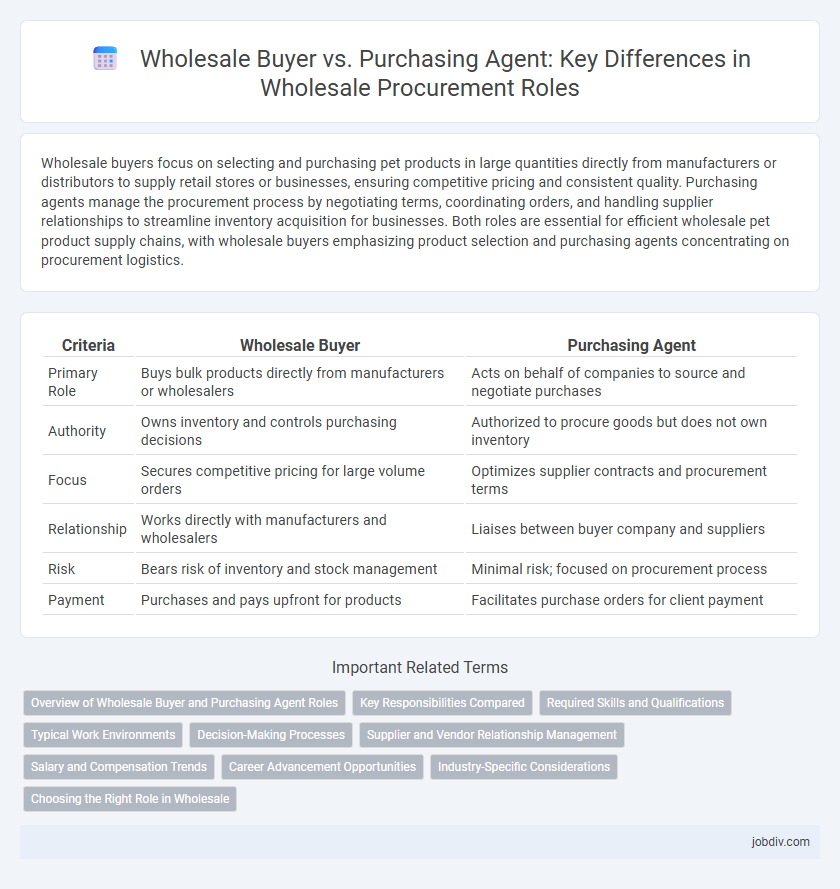Wholesale buyers focus on selecting and purchasing pet products in large quantities directly from manufacturers or distributors to supply retail stores or businesses, ensuring competitive pricing and consistent quality. Purchasing agents manage the procurement process by negotiating terms, coordinating orders, and handling supplier relationships to streamline inventory acquisition for businesses. Both roles are essential for efficient wholesale pet product supply chains, with wholesale buyers emphasizing product selection and purchasing agents concentrating on procurement logistics.
Table of Comparison
| Criteria | Wholesale Buyer | Purchasing Agent |
|---|---|---|
| Primary Role | Buys bulk products directly from manufacturers or wholesalers | Acts on behalf of companies to source and negotiate purchases |
| Authority | Owns inventory and controls purchasing decisions | Authorized to procure goods but does not own inventory |
| Focus | Secures competitive pricing for large volume orders | Optimizes supplier contracts and procurement terms |
| Relationship | Works directly with manufacturers and wholesalers | Liaises between buyer company and suppliers |
| Risk | Bears risk of inventory and stock management | Minimal risk; focused on procurement process |
| Payment | Purchases and pays upfront for products | Facilitates purchase orders for client payment |
Overview of Wholesale Buyer and Purchasing Agent Roles
Wholesale buyers are responsible for selecting and purchasing large quantities of products directly from manufacturers or distributors, focusing on cost efficiency and supplier relationships to meet the demands of retail or resale markets. Purchasing agents handle procurement processes across various industries, negotiating contracts, managing supplier communications, and ensuring timely delivery of goods to support organizational operations. Both roles require strong negotiation skills and market knowledge, but wholesale buyers specialize in bulk product acquisition for resale, whereas purchasing agents oversee broader procurement activities.
Key Responsibilities Compared
Wholesale buyers focus on selecting and purchasing products in bulk for resale, analyzing market trends, negotiating prices, and managing supplier relationships to ensure optimal inventory levels. Purchasing agents primarily handle procurement for businesses, evaluating supplier bids, processing purchase orders, and ensuring compliance with quality and budget standards. Both roles require strong negotiation skills and market knowledge, but wholesale buyers emphasize product assortment and sales potential, while purchasing agents concentrate on operational procurement efficiency.
Required Skills and Qualifications
Wholesale buyers require strong negotiation skills, market analysis capabilities, and deep knowledge of product trends to secure favorable deals and maintain supplier relationships. Purchasing agents need expertise in contract management, inventory control, and compliance with procurement regulations to ensure timely and cost-effective acquisition of goods. Both roles demand excellent communication abilities, attention to detail, and proficiency in supply chain management software.
Typical Work Environments
Wholesale buyers typically work within retail companies, distribution centers, or manufacturing firms, where they negotiate bulk purchases directly from suppliers to ensure inventory meets consumer demand. Purchasing agents often operate in government agencies, large corporations, or specialized procurement departments, handling contract negotiations and vendor management to acquire a wide range of goods and services. Both roles frequently require office settings with access to market data and supplier communication tools, but purchasing agents may also perform on-site inspections and vendor evaluations.
Decision-Making Processes
Wholesale buyers prioritize volume discounts and supplier reliability when making purchasing decisions, focusing on long-term partnerships and cost-effectiveness. Purchasing agents emphasize evaluating individual order specifications and quality compliance to meet diverse client demands efficiently. Both roles require strategic analysis, but buyers align their choices with broader market trends, while agents concentrate on operational execution and detail accuracy.
Supplier and Vendor Relationship Management
Wholesale buyers focus on establishing and maintaining strong relationships directly with suppliers to negotiate favorable terms and ensure product quality, streamlining inventory procurement for their businesses. Purchasing agents act as intermediaries managing multiple vendor interactions, leveraging supplier data and performance metrics to optimize cost efficiency and delivery schedules. Effective supplier and vendor relationship management in wholesale requires collaborative communication, contract negotiation skills, and continuous evaluation of supplier reliability to maximize supply chain resilience.
Salary and Compensation Trends
Wholesale buyers typically earn salaries ranging from $50,000 to $90,000 annually, with bonuses and commissions based on sales performance significantly boosting total compensation. Purchasing agents generally have a salary range between $45,000 and $80,000, with additional benefits tied to contract negotiations and supplier management efficiencies. Trends indicate increasing compensation in both roles due to growing demand for supply chain expertise and the rise of e-commerce in wholesale markets.
Career Advancement Opportunities
Wholesale buyers often have clearer career advancement opportunities through specialization in product categories or supplier negotiations, leading to roles such as procurement manager or category director. Purchasing agents typically gain experience in contract management and supplier relations, which can propel them toward positions like senior purchasing agent or supply chain coordinator. Both careers offer pathways to leadership roles within supply chain management, but wholesale buyers generally benefit from a stronger focus on strategic purchasing and market analysis.
Industry-Specific Considerations
Wholesale buyers in industries such as retail and manufacturing prioritize bulk purchasing to maximize cost efficiency and ensure consistent supply, often negotiating volume discounts directly with suppliers. Purchasing agents, especially in sectors like healthcare or technology, focus on acquiring specialized products that meet strict regulatory standards and quality requirements, acting as intermediaries between businesses and vendors. Industry-specific considerations influence their roles, with wholesale buyers driving strategic supplier relationships and purchasing agents handling tactical procurement to meet precise organizational needs.
Choosing the Right Role in Wholesale
Wholesale buyers focus on selecting and purchasing large quantities of goods directly from manufacturers, optimizing cost and product quality for resale. Purchasing agents may represent a variety of businesses, negotiating terms and managing supplier relationships to ensure timely delivery and compliance with specifications. Choosing the right role depends on the scope of responsibilities and the strategic goals of the wholesale operation, with buyers driving procurement strategy and agents handling supplier logistics and contract management.
Wholesale Buyer vs Purchasing Agent Infographic

 jobdiv.com
jobdiv.com